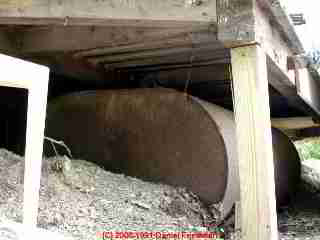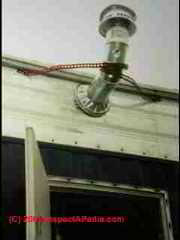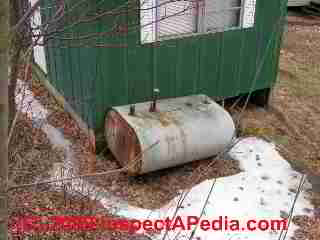 Mobile Home Oil Tanks
Mobile Home Oil Tanks
ASTs & USTs for Manufactured Homes, Mobile Homes, Double wides, Trailers
- POST a QUESTION or COMMENT about how to troubleshoot & fix problems in manufactured home or mobile home heating systems: furnaces, electric heaters, heat pumps for manufactured homes, mobile homes, trailers, RVs.
Mobile home heating oil storage tank issues.
This article series describes how to spot common and dangerous defects in heating equipment incuding furnaces and boilers, inadequate heat distribution, freeze-ups, and safety hazards. Mobile home or manufactured home heating ductwork defects. Mobile home insulation defects and remedies to reduce heating costs.
InspectAPedia tolerates no conflicts of interest. We have no relationship with advertisers, products, or services discussed at this website.
- Daniel Friedman, Publisher/Editor/Author - See WHO ARE WE?
Manufactured Home & Mobile Home Heating System Problems
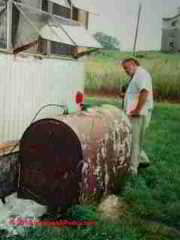 Question: Is the home owner responsible for the removal of the oil tank?
Question: Is the home owner responsible for the removal of the oil tank?
I know of a situation where there is an oil tank located under a 'permanent' mobile home in Ontario which is on Leased Land. The tenant owns the mobile home, and purchased the mobile home without any home inspection.
Thinking that the home at the time of purchases was heated by an electric furnace, the purchaser never thought about a possible abandoned oil tank sitting under the home. (Back in the 70's, the then home home owner switched from oil heat to electric, and abandoned the oil tank).
The Land Owner was unaware of the oil tank until recently.
The question: Is the home owner responsible for the removal of the oil tank, and is this specifically in writing anywhere ?
Thanks for your input, - anonymous by private email 2018/05/22
Photo: Steve Vermilye inspecting the oil tank at a U.S. mobile home park. An AST oil tank sitting in direct soil contact is more-likely to rust through and leak. [Click to enlarge any image]
Reply: case law, park owner's oil tank responsibility: up to point of connection to the home for park-installed tanks
My experience with this topic is that the home owner or property owner, in this case probably the home owner, is responsible for oil tanks in, on, or under their home.
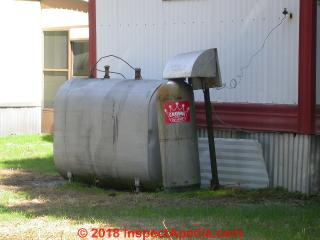 Local regulations or provincial regulations as well as your local environmental inspector may have her own view.
Local regulations or provincial regulations as well as your local environmental inspector may have her own view.
Let's not put the cart before the horse here.
In Ontario since 2002 oil tanks had to be registered.
IF the oil tank has leaked then the leak must be reported and cleaned up. In Ontario, homeowners are also required to call the Spills Action Centre of the Ministry of Environment at 1-800-268-6060.
If an oil tank has not leaked its removal is not required.
If there is a significant expense involved, then your "friend" needs to consult with her attorney since it's a Canadian lawyer in Ontario who would be able to review the documents involved, title, lease forms, rental law, to advise on who owns what when it comes to a spill cleanup.
See OIL TANK REGULATIONS - CANADA
Reader follow-up: going to court over who is responsible for the oil tank: mobile park owner or mobile home owner?
Thank you very much for this info.
I would add that the original home owner paid for an oil heat system which included payment for the tank which was attached to the furnace via a fuel line. The oil tank is as much a part of the home as the appliances were. It doesn't matter whether it was under the home or in the bath tub.
Just because he disconnected and kept the tank hidden, doesn't make it suddenly become someone else's responsibility.
If you are interested, there is more:
I am the landowner of the mobile home park. The original land lease tenant who owned the home sold it to another person, who in turn sold it to the present owner of the home.
The present tenant lived with the tank for a decade, and now claims he did not know it was there. This is a large tank sitting on the ground, and the "floor" of the home had to be notched to accommodate it.
It is not possible to even peak under the home without seeing it.
You must sign a set of Park Rules in order for us to accept you as a tenant in our Park. The present home owner avoided signing the rules for 6 months - said he would get around to it. One of the clauses in our Park Rules: NO oil tanks are permitted under homes! He knew it was there.
Last fall, the present tenant tried to sell the home (way undervalue) on kijiji, and found a buyer who was smart enough to have the home inspected. Guess what the inspector found. At that time I was informed about the tank by the present owner, who said I should get rid of it. Words ensued.
I found a TSSA licensed contractor who determined that the tank was leaking, and who, rightly so, contacted the TSSA. A TSSA inspector determined that there was a leak, and told the present owner that they were responsible for the leak and the resulting cleanup, and not to attempt to sell the home until all was cleaned up.
(At that time the TSSA inspector told me over the phone that the TSSA go after the home owner first, then the land owner if the home owner skips. They will not commit to this in writing. That is why they issue a cleanup order to both the home owner AND the land owner.)
It took time, but the present owner finally contacted the licensed contractor and commissioned him to remove the tank and cleanup the leak, all the while blaming me, the land owner, for allowing the sale of the home to him because he says I knew the tank was there.
All was cleaned up and done in about 4 months, at a cost of $14,000. (Cleanups of this nature typically cost $100,000+++.)
The present owner refused to pay. However, after another month passed and many letters from us, the present owner paid the bill in full. The present owner than put the home up for sale, adding $14,000 to the original price, and found a buyer who paid that price. Technically he is not out any expense at all, just a 5 month delay.
Now it gets better. Last week, some 8 months later after the present owner moved out, I get an email saying that if I don't send him a certified cheque for $14,000, he will take me to small claims court for that amount.
His claim is that I knew all along that the tank was there, and never removed it or said anything to him when he bough the home. This is preposterous since that leaking tank jeopardized the drinking water in my Park, and I could have lost the Park as a result.
It would sure be nice to find something in writing which says the tank belongs to the home owner, not the land owner.
I am preparing for court as we speak. I just wanted some other opinions, hence the email to you. I am worried because you never what happens when you get in front of a judge.
My wife and I have owned this Park for 28 years, with only one minor brush with small claims court (which we won). 90% of our tenants like us, and we are proud of this.
If a judge rules against us, this would set a very dangerous precedent for all land lease owners in Ontario.
The message to tenants would be " it's okay to abandon your oil tank and let it leak, because the landlord will take care of it".
Reply: Mobile Home Park Owner responsibilty for mechanicals "up-to the point of connection to the home" vs. Oil tanks installed by tenant / home-owner
IF an oil storage tank is a centralised facility providing heating oil to multiple mobile homes at a mobile home park,
OR an oil storage tank is permanently installed underground at a rental home site, forming part of the rental property not the (movable) rental home
THEN the oil storage tank (i.e. an AST or above ground storage tank) belongs to and is part of the home that it served, just as does the heating furnace or boiler that burns the oil and provides heat to the home.
Photo: an outdoor oil storage tank, half-buried under an entry deck. Nothing about this oil tank installation was proper and leaks were likely.
However, a review of case law regarding the assignment of responsibility for oil storage tanks at mobile home parks and similar properties at which the home owner rents the land under the home from the park owner, it is common for courts to find that the land owner or park owner is responsible for mechanical systems and facilities up to the point of connection of the system or facility to the home.
Your description that the mobile home owner had the cleanup done and paid for it and recouped the cost of that payment seems to me to be grounds for an out-of-hand dismissal of the case in court. But then if you're seen as the deep pocket rich landlord I'm not sure how the court will actually respond. (That's not my assertion nor opinion, it's an editorial remark)
I agree that an oil tank is part of a home - in most cases. Occasionally I come across a moblie home park that provides certain centralized services such as water, septic, and less-often shared oil tanks. The exception probably proves your rule.
Where an oil tank leak gets extra messy is when my oil tank leaks onto your land. We'll both agree that the cleanup cost should be mine not yours. But if I've disappeared you could be stuck with those costs.
That's common in the U.S. (here's an example for NY ahttps://ag.ny.gov/environmental/oil-spill/oil-spills-homes-and-businesses ) and in Canada as your own conversation with TSSA found as well.
I've inspected properties where a prior tenant contaminated the land and the landowner was expected to pay for the cleanup.
An example of this problem is described by this property inspection anecdote. The landlord of a strip mall with multiple tenants didn't know about a pre-existing site contamination.
The buyer had me [DF] inspect the property. (multi-unit rental strip mall). I saw a trailer parked in the woods. It had been used to store pesticides. That raised a red flag. I called for an environmental inspection.
The environmental inspection found that pesticide spills were not an issue but in testing found that a prior tenant (two tenants back) had operated a nickel-plating operation on the site and had contaminated the site and a nearby stream with cadmium.
The state DEC got involved immediately and demanded that the owner do the cleanup.
The cost to do so would have been more than the worth of the property. It was a disaster.
The owner had no recourse as the prior tenant was long gone.
Owner offered to simply abandon the property, and DEC re-negotiated.
I offer the following to help, so don't let it make you angry with me. In preparation for an argument one needs to be ready for objections that can be raised.
In your case it is of course possible but unlikely that over the course of 10 years a mobile home owner would have no occasion to look or have their repair person look under the home where the AST was located.
Reader follow-up
I know for a fact that the tenant was under the mobile home about a while back. He went under there to shut the water off as the home was to be vacated for the winter. He caused a water leak and I had to call in my plumber to repair. Yes my plumber would have seen the oil tank, but he has no clue about whether it should be there or not. He fixed the leak and I billed the tenant.
Should the plumber have known that no oil tanks are allowed under homes in my Park??? Be sure he does now.
I banned oil heat of any kind a while back - propane or electric heat only.
Comments continue:
While a property-seller is oblilgated to disclose substantive defects at the property being sold, (here the mobile home and its appurtenances), and may claim ignorance of certain defects, a buyer might have claim against the seller of the home but it seems a stretch for the buyer of the home to have a case against the landowner of the land under the home.
Furthermore in real estate law it's established that caveat-emptor is particularly apt. The buyer has to do their own due-diligence.
( I'm not qualified on this point and I am not an attorney.)
But your case in court needs to be prepared to defend your assertion that as property owner you would have no occasion to inspect nor way to know, over the course of 28 years, that such a tank was there.
The fact that you have a "no oil tanks" rule indicates that you were aware of possible issues.
The lawyer for the other side may challenge a claim that you didn't know and would have no way to know nor a reason to know about ASTs on your property.
(It also suggests that you probably should inspect (and you have the right to inspect) every home on the property- if one has or had an oil tank so might others.)
Reader follow-up comment: Last September I had a TSSA licensed contractor go under every home, and look in every shed and garage for ANY oil tanks. He found none.
Watch out: In preparation for your case be sure to read these US cases (I am still looking for Canadian cases) - typical rules on who is responsible for oil tanks at a MH park do not look good for your case so you need to be prepared and perhaps to seek expert legal advice. In my opinion the possible cost to you, particularly if there are multiple oil tanks on your property, could be so high that getting expert advice is probably worth the cost even if it'd be high vis-a-vis the one active case in which you're involved.
OPINION: I think you would have to show that when you rented the site there was no AST installed (nor a UST) and that the oil tank was added without your permission, against your rules, and without your knowledge. When the tank has been present across several owners, making that case can be more-difficult.
To assign responsibility for the aboveground oil storage tank located under the home in question I expect your attorney to want to establish that
- Your mobile home park does not provide nor permit oil storage tanks at the property
- The homeowener installed the oil storage tank
Watch out: IF the oil tank has leaked then the leak must be reported and cleaned up. In Ontario, homeowners are also required to call the Spills Action Centre of the Ministry of Environment at 1-800-268-6060.
See CANADIAN OIL STORAGE TANK REGULATIONS
If an oil tank has not leaked its removal is not required.
If there is a significant expense involved, then your "friend" needs to consult with her attorney since it's a Canadian lawyer in Ontario who would be able to review the documents involved, title, lease forms, rental law, to advise on who owns what when it comes to a spill cleanup.
It will help your case if you have a park rules/policies including oil tanks in the park and that the tenant signed that.
Your inspection finding no oil tanks probably means "no other oil tanks than the one under discussion" or if the inspection was after the removal "no oil tanks" would be evidence that you were not (and perhaps have never) provided or included on-site oil storage or even permitted oil heat among your tenants.
That argues against the claim that you would have provided the oil storage "up to the point of connection to the home" as in common documents on this topic.
Reader follow-up:
The TSSA certified contractor inspection was done AFTER the oil tank in question was removed.
Heating systems in the homes of Tenants in our Park are, and have always been (since 1976), the sole responsibility and concern of the Tenant.
The Tenant in question decided to change from oil heat to electric heat sometime between 1987 and 1993, and made the decision to just leave the oil tank where it was.
He didn't have to inform anyone that he made the change, just as if he had decided to change a fridge. (He also removed the Fill Pipes so that nothing protruded out from the skirting.) - 2018/05/25
Moderator reply:
Am I right in reading your note that the homeowner who changed from oil to electric heat, or a previous owner of the same property, had therefore installed oil heat before sometime between 1987 and 1993 and that that installation, at that time of installation, would also have violated your park rules and lease contracts?
Reader follow-up:
We purchased the Park in 1990.
We had tenants remove under home oil tanks and replace with side mounted oil tanks (at their expense) between 1993 and 1996.
In 1993 we met with the Fire Department because they wanted our tenants to fill out a form that stipulated the type of heating system they had, and whether tenants had any combustible materials in their home. The tenant at the time filled in the form that he had electric heat and NO combustibles. We actually have that signed form.
It was the Fire Department that put the bug in our head that oil tanks under homes could leak and no one would know about the leak for years.
Fearing water supply contamination, we went around to those tenants that had oil heat (based on the forms they filled out) and had them install side mounted tanks, and remove the under home oil tanks.
Many were not pleased (it was $650-$750 that they had to pay), but eventually all (so we thought) did so. There were about a half dozen involved.
At that time (1993) we added a new clause to our Park Rules - Oil tanks under homes are prohibited, and added that oil spill and resultant cleanup costs are the sole responsibility of the Tenant, and that they must have at least one million dollars worth of insurance to cover this. Looking back I would humbly say we were proactive and pretty smart.
We never thought about a tenant being deceitful, so we were certainly naive as well. Are we liable for being naive??
This is what the Tenant who is suing us signed (after a 6 month delay) in 2004.
A lot of details - but we have all the documents and required papers.
By the way, a year prior to our recent incident, another tenant (across our road) had, believe it or not, an oil leak.
The oil line of the SIDE mounted tank had split (water must have gotten in there and froze) and about 5 gallons leaked out. The TSSA was called in as well as an Ottawa contractor. It took 2 years and quarter of a million dollars to clean up the mess - the home had to be moved while it was done.
This for a tank that was almost empty. An excessive money grab imho. I was not involved with any of it since the tenant had insurance, they handled it all. Whew!
It was after this that we banned ANY oil heat in our Park.
Regulations, Litigation, & Rulings Iinvolving MH park USTs / ASTs & MH Park Owner Rrsponsibilities
- CANADIAN OIL STORAGE TANK REGULATIONS - separate article
- MASSACHUSETTS ATTORNEY GENERAL'S GUIDE to MANUFACTURED HOUSING COMMUNITY LAW, retrieved 2018/05/24, original source: https://www.mass.gov/files/documents/2017/11/13/MHC%20Guidebook%20%28Nov%202017%29.pdf -
Clarifies an Owner/Operator’s responsibility to supply, maintain, repair, and replace utility systems (including oil tanks and their appurtenances and other components) up to the point of connection at each manufactured home. See pages 14, 21, & 22;
Excerpts:
e. Utility Systems Maintenance. A community owner/operator is responsible for supplying, maintaining, and repairing all equipment and systems that provide utilities up to the point of connection at each manufactured home. The required utilities include drinkable water, a functioning sewage disposal system, electricity, and natural gas or other heating fuel.
h. Oil Storage Tanks. In recent years, community owner/operators have become concerned about their potential legal liability stemming from the environmental risks posed by leaking oil storage tanks as well as these tanks’ appurtenance and other components.
The Regulations require that the cost of removing, replacing or repairing an oil storage tank and its appurtenances and other components should be initially incurred by the community owner/operator, who is usually better able to pay for or finance these costs upfront.
Thus, you may not be charged directly for the removal or replacement of oil storage tanks or their appurtenances and other components, but your community owner/operator may eventually recover such costs as capital improvements, in the manner allowed by law. 940 C.M.R. 10.03(2)(n).
This general rule applies whether the tank is above37 or below-ground. There is one exception to the general rule: where your negligence has caused the environmental concern or risk posed by the oil tank, you may be held directly responsible for removing or replacing it. 940 C.M.R. 10.03(2)(n).
37 Some community owner/operators try to avoid these costs by claiming that the residents have purchased their above-ground oil tanks. Ownership of the tank is irrelevant as it is a utility system that attaches to the point of connection of the home and is, therefore, the owner/operator’s responsibility to maintain, repair, remove, and replace as necessary. 940 C.M.R. 10.05(4). See Section II.D.1.e of this guide.
This argument also often fails because purchasing the tank may have been an impermissible condition of entry into the community rather than armslength transaction.
I find some of the dispute-cases (below) surprising since it seems to me that when you rent a lot, the most you'd normally provide might be a pad, hookups to water and septic or sewer and electric.
I have inspected many mobile homes and parks. I've not encountered on at which a homesite was sitting ready for rental with an AST already in place. In fact an AST at the site would perhaps obstruct the placement of the home.
The issue arises when a land-tenant who owns their home installs a tank and includes it (of course) when the home is subsequently sold. All of that would be a reason for the landowner to be concerned with on-site oil tanks.
- NEW YORK: OIL SPILLS AT HOMES and BUSINESSES, [PDF] New York State DEC
Excerpt:
Although the owner of the tank is responsible for cleanup costs, other responsible parties may be compelled to pay some or all of any costs.
Homeowners may want to contact their insurance company to determine whether costs and damages from oil spills and leaks are covered by their homeowner insurance policy. In addition, homeowners can check to make sure their fuel company has insurance that would pay for a petroleum spill that the company causes. - MANUFACTURED (MOBILE) HOME PARKS [PDF] Pennsylvania Legal Aid Network, PALawHELP.org
M. Floyd Hall, "MOBILE HOME OWNERS WIN OIL TANK DISPUTE" retrieved 2018/05/23, original source: http://articles.mcall.com/1994-02-01/news/2965194_1_home-park-spg-home-owners
Excerpt:
The state filed suit in Commonwealth Court in November 1991 on behalf of the residents, who argued that the park provided the original underground tanks and, therefore, should replace them. SPG contended the tanks were actually installed by the tenants as their lots were developed.
At issue was whether mobile home park owners are responsible for capital improvements to the land they lease.
"We did not challenge SPG's right to require the fuel tanks be above ground, but contended that SPG should have paid for the work to implement the new rule," said Attorney General Ernie Preate Jr. in a statement. - Alana Melanson, COURT: MANAGEMENT of MOBILE-HOME PARK RESPONSIBLE for EXTERIOR HEATING SYSTEMS Lowell Sun News, 2017/11/09, Email: amelanson@lowellsun.com Website: http://www.lowellsun.com/- retrieved 2018/05/24, original source: http://www.lowellsun.com/news/ci_31441093/court-management-mobile-home-park-responsible-exterior-heating-systems
Residents of the Chelmsford Commons received a treat just a few days before Halloween in the form of a court ruling that the mobile-home park is responsible for maintaining exterior home heating oil infrastructure.
According to an Oct. 27 Middlesex Superior Court judgment, Michigan-based RHP Properties Inc. and its subsidiary Chelmsford Group LLC are permanently enjoined from implementing or engaging in any policies or procedures that violate state AttorneyGeneral regulations indicating such parks are responsible for all of the utilities outside, up to the point of connection on the mobile home. - PARK MAINTENANCE PROBLEMS, [PDF] CVOEO Champlain Valley Office of Economic Opportunity, retrieved 2018/05/23, original source: https://www.cvoeo.org/index.cfm?fuseaction=dep_menu&menu_id=5110&dept_id=13 discusses tenants' rights and obligations concerning utilities and does not mention oil tanks
Relevant as an example: "The park owner is responsible for taking care of any part of the septic system that is underground. "
That text suggests that UNDERGROUND or permanently-installed facilities would be the park owner's responsibility (therefore not ASTs) but other rulings hold that the property owner or mobile home park owner is responsible for services "up to the point of connectionto the home"
My OPINION is that this is not a rational nor reasonable assumption for a mobile home park at which the above ground oil storage tank is bought and installed by the mobile home owner.
General Information About Tenants' Rights in Mobile Home Parks
- MANUFACTURED HOMEOWNERS WHO RENT LOTS LACK SECURITY of BASIC TENANT RIGHTS [PDF] Consumers Union, Website: https://consumersunion.org/ - retrieved 2018/05/24, original source: https://consumersunion.org/pdf/manhome.pdf
Example of Mobile Home park rules including hookups to utilities
ORCHARD ESTATES MHC LLC RULES & REGULATIONS [PDF] retrieved 2018/05/24, original source: http://horizonlandco.com/pdf/applications/orchard-estates-rules-regulations.pdf
Mobile Home / Manufactured Home Heating Oil Storage Tank Defects
- Outside heating oil tank not protected from freezing (using more expensive kerosene mix?) or use of heating tapes on heating oil lines - a possible fire risk (photo above)
See ABOVE GROUND OUTDOOR OIL TANKS
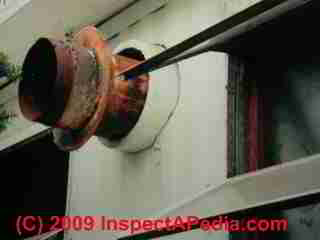
- Underground oil storage tank (UST) or above ground oil storage tank (AST) leaks: a home owner is generally responsible for the reporting and clean-up costs if an oil storage tank leaks.
These costs can be very high, even disastrous. At a mobile home park some case law suggests that for permanently-installed utilities the mobile home park owner is responsible for those services and that equipment.
See OIL TANK, BURIED, ADVICE
Even for above ground oil storage tanks, the mobile home park owner may be held responsible for that equipment as often laws distinguish between the mobile home and utilities provided "up to the point of connection to the home".
See ABOVE GROUND OUTDOOR OIL TANKS
And see OIL TANK LEAKS & SMELLS - home
Watch out: be sure that the ownership and responsibility for oil storage tanks at a mobile home is given clearly and that the home complies with the park rules and regulations.
...
Continue reading at MOBILE HOME HEATING SYSTEMS or select a topic from the closely-related articles below, or see the complete ARTICLE INDEX.
Or see these
Recommended Articles
- OIL or GAS FUELED HEATING EQUIPMENT SHUTOFFS
- OIL SPILL CLEANUP / PREVENTION
- OIL STORAGE TANKS - home
- OIL TANK ABOVE GROUND (AST) GUIDE
- OIL TANK INSPECTION & TROUBLESHOOTING
- OIL TANK LEAKS & SMELLS - home
- OIL TANK PIPING & PIPING DEFECTS - home
- OIL TANK PRESSURE
- OIL TANK LEAK & ABANDONMENT REGULATIONS
- OIL TANK SAFETY
- OIL TANK SPILL CLEANUP / PREVENTION
- OIL TANK SUPPORT
- OIL TANK TESTING & REMOVAL COs
Suggested citation for this web page
MOBILE HOME OIL TANKS at InspectApedia.com - online encyclopedia of building & environmental inspection, testing, diagnosis, repair, & problem prevention advice.
Or see this
INDEX to RELATED ARTICLES: ARTICLE INDEX to MANUFACTURED & MOBILE HOMES
Or use the SEARCH BOX found below to Ask a Question or Search InspectApedia
Ask a Question or Search InspectApedia
Try the search box just below, or if you prefer, post a question or comment in the Comments box below and we will respond promptly.
Search the InspectApedia website
Note: appearance of your Comment below may be delayed: if your comment contains an image, photograph, web link, or text that looks to the software as if it might be a web link, your posting will appear after it has been approved by a moderator. Apologies for the delay.
Only one image can be added per comment but you can post as many comments, and therefore images, as you like.
You will not receive a notification when a response to your question has been posted.
Please bookmark this page to make it easy for you to check back for our response.
IF above you see "Comment Form is loading comments..." then COMMENT BOX - countable.ca / bawkbox.com IS NOT WORKING.
In any case you are welcome to send an email directly to us at InspectApedia.com at editor@inspectApedia.com
We'll reply to you directly. Please help us help you by noting, in your email, the URL of the InspectApedia page where you wanted to comment.
Citations & References
In addition to any citations in the article above, a full list is available on request.
- John Cranor [Website: /www.house-whisperer.com ] is an ASHI member and a home inspector (The House Whisperer) is located in Glen Allen, VA 23060. He is also a contributor to InspectApedia.com in several technical areas such as plumbing and appliances (dryer vents). Contact Mr. Cranor at 804-873-8534 or by Email: johncranor@verizon.net
- [5] "Modular Home Construction, special defects and inspection methods" Dan Friedman, NY Metro ASHI Seminar, Holiday Inn, Crowne Plaza, White Plains NY, October 4, 1996
- [9] New York State: "Manufactured Homes: an installation guide for the code enforcement official," undated. [Div. of Code Enforcement & Admin. - 518-474-4073, George E. Clark, Jr., Director] - this is a guide tool, not an enforcement code or standard.
- [10] HUD State Administrative Agency (for 36 states) (NY: 518-474-4073) - for complaints
- [11] Manufactured Housing Institute, 2101 Wilson Blvd. Ste. 610, Arlington VA 22201 703-558-0400 Web: mfghome.org
- [12] NYMHA, 35 Commerce Ave., Albany NY 12206-2015 518-435-9859 800-721-HOME (they want the Star Program to provide for separate assessment of manufactured homes)
- In addition to citations & references found in this article, see the research citations given at the end of the related articles found at our suggested
CONTINUE READING or RECOMMENDED ARTICLES.
- Carson, Dunlop & Associates Ltd., 120 Carlton Street Suite 407, Toronto ON M5A 4K2. Tel: (416) 964-9415 1-800-268-7070 Email: info@carsondunlop.com. Alan Carson is a past president of ASHI, the American Society of Home Inspectors.
Thanks to Alan Carson and Bob Dunlop, for permission for InspectAPedia to use text excerpts from The HOME REFERENCE BOOK - the Encyclopedia of Homes and to use illustrations from The ILLUSTRATED HOME .
Carson Dunlop Associates provides extensive home inspection education and report writing material. In gratitude we provide links to tsome Carson Dunlop Associates products and services.


